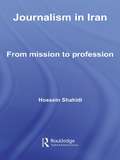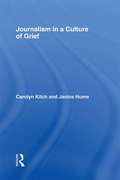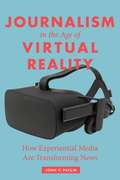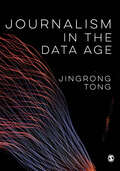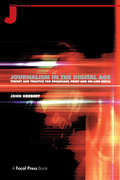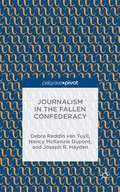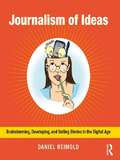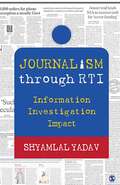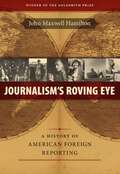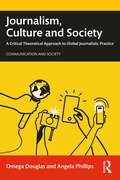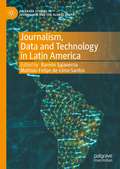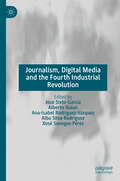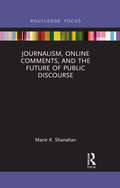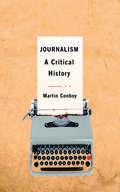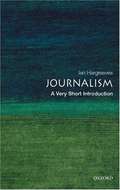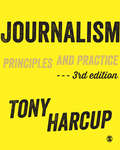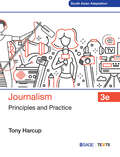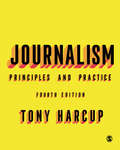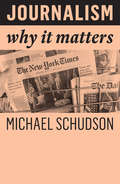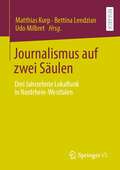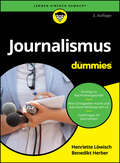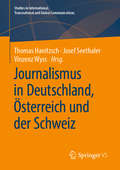- Table View
- List View
Journalism in Iran: From Mission to Profession (Iranian Studies)
by Hossein ShahidiFocusing on newspapers, radio and television, this book provides the first systematic investigation of the development of journalism in Iran following the 1979 Revolution and the establishment of the Islamic Revolution.
Journalism in a Culture of Grief
by Carolyn Kitch Janice HumeThis book considers the cultural meanings of death in American journalism and the role of journalism in interpretations and enactments of public grief, which has returned to an almost Victorian level. A number of researchers have begun to address this growing collective preoccupation with death in modern life; few scholars, however, have studied the central forum for the conveyance and construction of public grief today: news media. News reports about death have a powerful impact and cultural authority because they bring emotional immediacy to matters of fact, telling stories of real people who die in real circumstances and real people who mourn them. Moreover, through news media, a broader audience mourns along with the central characters in those stories, and, in turn, news media cover the extended rituals. Journalism in a Culture of Grief examines this process through a range of types of death and types of news media. It discusses the reporting of horrific events such as September 11 and Hurricane Katrina; it considers the cultural role of obituaries and the instructive work of coverage of teens killed due to their own risky behaviors; and it assesses the role of news media in conducting national, patriotic memorial rituals.
Journalism in the Age of Virtual Reality: How Experiential Media Are Transforming News
by John PavlikWith the advent of the internet and handheld or wearable media systems that plunge the user into 360º video, augmented—or virtual reality—technology is changing how stories are told and created. In this book, John V. Pavlik argues that a new form of mediated communication has emerged: experiential news. Experiential media delivers not just news stories but also news experiences, in which the consumer engages news as a participant or virtual eyewitness in immersive, multisensory, and interactive narratives.Pavlik describes and analyzes new tools and approaches that allow journalists to tell stories that go beyond text and image. He delves into developing forms such as virtual reality, haptic technologies, interactive documentaries, and drone media, presenting the principles of how to design and frame a story using these techniques. Pavlik warns that although experiential news can heighten user engagement and increase understanding, it may also fuel the transformation of fake news into artificial realities, and he discusses the standards of ethics and accuracy needed to build public trust in journalism in the age of virtual reality. Journalism in the Age of Virtual Reality offers important lessons for practitioners seeking to produce quality experiential news and those interested in the ethical considerations that experiential media raise for journalism and the public.
Journalism in the Data Age
by Jingrong TongThis book is your guide to understanding what journalism is and could be in an age of digital technology and datafication. Journalism today is entwined with the digital. Stories can come from crowdsourcing and content farms. They can incorporate data visualisations and virtual reality. Journalists can find themselves working as self-employed digital entrepreneurs or for tech giants like Google and Facebook. This book explores the development of journalism in this era of digital tech, and big and open data. It explores the crucial new developments of online journalism, data journalism, computational journalism and entrepreneurial journalism, and what this means for our understanding of journalism as a profession, and as a part of society. Using a wealth of international case studies, Jingrong Tong explores contemporary issues such as: AI, Automated news, ‘robot reporters’, and algorithmic accountability. Digital business models, from venture capital to tech start-ups to crowd-funding. Audiences and dissemination in and age of platform capitalism Questions of censorship, democracy and state control. Digital challenges to journalistic autonomy and legitimacy. With clear explanations throughout, Journalism in the Data Age introduces you to a range of ideas, debates and key concepts. It is essential reading for all students of journalism. Dr Jingrong Tong is Senior Lecturer in Digital News Cultures at the University of Sheffield.
Journalism in the Data Age
by Jingrong TongThis book is your guide to understanding what journalism is and could be in an age of digital technology and datafication. Journalism today is entwined with the digital. Stories can come from crowdsourcing and content farms. They can incorporate data visualisations and virtual reality. Journalists can find themselves working as self-employed digital entrepreneurs or for tech giants like Google and Facebook. This book explores the development of journalism in this era of digital tech, and big and open data. It explores the crucial new developments of online journalism, data journalism, computational journalism and entrepreneurial journalism, and what this means for our understanding of journalism as a profession, and as a part of society. Using a wealth of international case studies, Jingrong Tong explores contemporary issues such as: AI, Automated news, ‘robot reporters’, and algorithmic accountability. Digital business models, from venture capital to tech start-ups to crowd-funding. Audiences and dissemination in and age of platform capitalism Questions of censorship, democracy and state control. Digital challenges to journalistic autonomy and legitimacy. With clear explanations throughout, Journalism in the Data Age introduces you to a range of ideas, debates and key concepts. It is essential reading for all students of journalism. Dr Jingrong Tong is Senior Lecturer in Digital News Cultures at the University of Sheffield.
Journalism in the Digital Age: Theory and practice for broadcast, print and online media
by John HerbertProvides the practical techniques and theoretical knowledge that underpin the fundamental skills of a journalist. It also takes a highly modern approach, as the convergence of broadcast, print and online media require the learning of new skills and methods. The book is written from an international perspective - with examples from around the world in recognition of the global marketplace for today's media. This is an essential text for students on journalism courses and professionals looking for a reference that covers the skill, technology and knowledge required for a digital and converged media age. The book's essence lies in the way essential theories such as ethics and law, are woven into practical newsgathering and reporting techniques, as well as advice on management skills for journalists, providing the wide intellectual foundation which gives credibility to reporting.
Journalism in the Fallen Confederacy
by Debra Reddin van Tuyll Nancy Mckenzie Dupont Joseph R. HaydenDuring the American Civil War, several newspapers remained Confederate sympathizers despite their locations being occupied by Union troops. Examining these papers, the authors explore what methods of suppression occupiers used, how occupation influenced the editorial and business sides of the press, and how occupation impacted freedom of the press.
Journalism of Ideas: Brainstorming, Developing, and Selling Stories in the Digital Age
by Daniel ReimoldJournalism of Ideas is a comprehensive field guide for brainstorming, discovering, reporting, digitizing, and pitching news, opinion, and feature stories within journalism 2.0. With on-the-job advice from professional journalists, activities to sharpen your multimedia reporting skills, and dozens of story ideas ripe for adaptation, Dan Reimold helps you develop the journalistic know-how that will set you apart at your campus media outlet and beyond. The exercises, observations, anecdotes, and tips in this book cover every stage of the story planning and development process, including how news judgment, multimedia engagement, records and archival searches, and various observational techniques can take your reporting to the next level. Separate advice focuses on the storytelling methods involved in data journalism, photojournalism, crime reporting, investigative journalism, and commentary writing. In addition to these tricks of the trade, Journalism of Ideas features an extensive set of newsworthy, timely, and unorthodox story ideas to jumpstart your creativity. The conversation continues on the author’s blog, College Media Matters. Reimold also shows students how to successfully launch a career in journalism: the ins and outs of pitching stories, getting your work published, and navigating the post-graduation job search. Related sections of the book highlight the art of freelancing 2.0, starting an independent site, blogging, constructing quality online portfolios, securing internships, and building a social media following.
Journalism through RTI: Information Investigation Impact
by Shyamlal YadavHow RTI changed the face of investigative journalism in India, forever… The RTI Act has helped investigative journalism in getting information that otherwise would have been almost impossible to unearth despite legal provisions. Using the storyline approach, the author, through his own experiences, unravels how news was collected through persistent efforts using RTI, how the stories evolved, and how the subject was followed up keeping an eye on the rightful impact. Hence the emphasis is less on theory and more on practical aspects, making the book ‘a story behind India’s biggest news stories’.
Journalism's Roving Eye: A History of American Foreign Reporting (From Our Own Correspondent)
by John Maxwell HamiltonIn all of journalism, nowhere are the stakes higher than in foreign news-gathering. For media owners, it is the most difficult type of reporting to finance; for editors, the hardest to oversee. Correspondents, roaming large swaths of the planet, must acquire expertise that home-based reporters take for granted -- facility with the local language, for instance, or an understanding of local cultures. Adding further to the challenges, they must put news of the world in context for an audience with little experience and often limited interest in foreign affairs -- a task made all the more daunting because of the consequence to national security. In Journalism's Roving Eye, John Maxwell Hamilton -- a historian and former foreign correspondent -- provides a sweeping and definitive history of American foreign news reporting from its inception to the present day and chronicles the economic and technological advances that have influenced overseas coverage, as well as the cavalcade of colorful personalities who shaped readers' perceptions of the world across two centuries.From the colonial era -- when newspaper printers hustled down to wharfs to collect mail and periodicals from incoming ships -- to the ongoing multimedia press coverage of the Iraq War, Hamilton explores journalism's constant -- and not always successful -- efforts at "dishing the foreign news," as James Gordon Bennett put it in the mid-nineteenth century to describe his approach in the New York Herald. He details the highly partisan coverage of the French Revolution, the early emergence of "special correspondents" and the challenges of organizing their efforts, the profound impact of the non-yellow press in the run-up to the Spanish-American War, the increasingly sophisticated machinery of propaganda and censorship that surfaced during World War I, and the "golden age" of foreign correspondence during the interwar period, when outlets for foreign news swelled and a large number of experienced, independent journalists circled the globe. From the Nazis' intimidation of reporters to the ways in which American popular opinion shaped coverage of Communist revolution and the Vietnam War, Hamilton covers every aspect of delivering foreign news to American doorsteps.Along the way, Hamilton singles out a fascinating cast of characters, among them Victor Lawson, the overlooked proprietor of the Chicago Daily News, who pioneered the concept of a foreign news service geared to American interests; Henry Morton Stanley, one of the first reporters to generate news on his own with his 1871 expedition to East Africa to "find Livingstone"; and Jack Belden, a forgotten brooding figure who exemplified the best in combat reporting. Hamilton details the experiences of correspondents, editors, owners, publishers, and network executives, as well as the political leaders who made the news and the technicians who invented ways to transmit it. Their stories bring the narrative to life in arresting detail and make this an indispensable book for anyone wanting to understand the evolution of foreign news-gathering. Amid the steep drop in the number of correspondents stationed abroad and the recent decline of the newspaper industry, many fear that foreign reporting will soon no longer exist. But as Hamilton shows in this magisterial work, traditional correspondence survives alongside a new type of reporting. Journalism's Roving Eye offers a keen understanding of the vicissitudes in foreign news, an understanding imperative to better seeing what lies ahead.
Journalism, Culture and Society: A Critical Theoretical Approach to Global Journalistic Practice (Communication and Society)
by Angela Phillips Omega DouglasDrawing upon a range of theoretical perspectives, including cultural studies, postcolonial theory, critical race studies, political economy and sociology, Journalism, Culture and Society examines journalism as a democratic necessity that often fails to live up to its promise. This text takes a step back from prevailing idealistic approaches in which theory is often seen as a threat rather than a service to the better understanding of practice, and mainstream journalism in western democracies is seen as unproblematic. Instead, using international examples, the authors provide a critique for those who seek to improve journalistic practice, whilst not losing sight of the profound practical dilemmas that journalists around the world experience in their working lives – from the resources available to them, to the institutions and political contexts in which they work. Readers are encouraged to consider why journalists choose (or are expected to choose) particular subjects or tropes in their work, and the implications of these choices. Journalism, Culture and Society is a valuable resource for students, academics, and practitioners in the areas of media, journalism and communication.
Journalism, Data and Technology in Latin America (Palgrave Studies in Journalism and the Global South)
by Ramón Salaverría Mathias-Felipe de-Lima-SantosThis book explores innovative approaches to digital and data journalism in Latin America, brought by both legacy media and newcomers to the industry, with the purpose of examining this changing media landscape. As part of the Global South, Latin America has shown significant influence in the promotion of data and digital technologies applied to journalism in recent years. In this region, news entrepreneurs are becoming an essential source of innovation in news production, circulation, and distribution. The book considers news media, particularly in Latin America, as an open set of practices intertwined in the evolution of technology. It discusses the transformation of the Latin American news media ecosystem and considers how it has shaped the industry despite local differences. The study fills a significant gap in academic scholarship by addressing the multiple external factors, mainly political and economic, which have contributed to the relative lack of studies on the patterns of journalism in this region.
Journalism, Digital Media and the Fourth Industrial Revolution
by Alba Silva-Rodríguez José Sixto-García Alberto Quian Ana-Isabel Rodríguez-Vázquez Xosé Soengas-PérezThe Fourth Industrial Revolution, also known as Industry 4.0, is the fourth most important industrial stage that has occurred since the beginning of the Industrial Revolution in the 18th century. This new revolution is characterized by combining cutting-edge production techniques with intelligent systems that integrate with organizations and people. Communication and journalism, especially digital media, face the challenge of integrating emerging technologies and practices or in-test or developing technologies into companies and communicative products, that are breaking down the boundaries between physical, digital, and biological. This collection analyzes and reflects on the impact of Industry 4.0 on journalism and digital media. The collection is split into three parts. The first part analyzes the emergence of centralized and decentralized networks and their impact on digital media. Specifically, it delves into the role of cryptographic journalism and the impactof free and collaborative networks in the fediverse to fight against disinformation and censorship, as well as to promote data and metadata journalism. In a second part, the "innovation of innovation" is explored with the aim of continuing to create products that satisfy the needs of 4.0 audiences. This is where the challenges and opportunities offered by the metaverse, content automation technologies, the impact of the Internet of Things on journalism, labs, the application of R+D+I to journalism, and collaborative encounters between journalists to develop highly innovative proposals are explored. Finally, in the third part of the book, the emergence of new communicative and journalistic actors in the 4.0 context is reviewed. Examples include start-ups, spin-offs or other entrepreneurial initiatives, communication of knowledge transfer, new financing models, and outsourcing of tasks, new proposals for newsgames, or the impact of artificial intelligence in journalism practices. In addition, a final chapter is dedicated to exploring the new professional skills needed for journalists in this Fourth Industrial Revolution.
Journalism, Online Comments, and the Future of Public Discourse
by Marie K. ShanahanComments on digital news stories and on social media play an increasingly important role in public discourse as more citizens communicate through online networks. The reasons for eliminating comments on news stories are plentiful. Off-topic posts and toxic commentary have been shown to undermine legitimate news reporting. Yet the proliferation of digital communication technology has revolutionized the setting for democratic participation. The digital exchange of ideas and opinions is now a vital component of the democratic landscape. Marie K. Shanahan's book argues that public digital discourse is crucial component of modern democracy—one that journalists must stop treating with indifference or detachment—and for news organizations to use journalistic rigor and better design to add value to citizens’ comments above the social layer. Through original interviews, anecdotes, field observations and summaries of research literature, Shanahan explains the obstacles of digital discourse as well as its promises for journalists in the digital age.
Journalism: A Critical History (Basics Ser.)
by Dr Martin ConboyTraditional news values no longer hold: infotainment has the day. Journalism is in a terminal state of decline. Or so some contemporary commentators would argue. Although there has been a great diversity in format and ownership over time, Conboy demonstrates the surprising continuity of concerns in the history of journalism. Questions of political influence, the impact of advertising, the sensationalisation of news coverage, the 'dumbing down' of the press, the economic motives of newspaper owners - these are themes that emerge repeatedly over time and again today. In this book, Martin Conboy provides a history of the development of newspapers, periodicals and broadcast journalism which · enables readers to engage critically with contemporary issues within the news media · outlines the connections, as well as the distinctions, across historical periods · spans the introduction of printed news to the arrival of the 'new' news media · demonstrates how journalism has always been informed by a cultural practices broader and more dynamic than the simple provision of news By situating journalism in its historical context, this book enables students to more fully understand the wide range of practices which constitute contemporary journalism. As such it will be an essential text for students of journalism and the media.
Journalism: A Very Short Introduction
by Ian HargreavesAlmost everyone reads the newspaper, browses the Internet, listens to the radio or watches TV. Journalism has an indelible effect on our worldview--from the fight against global terrorism to the American presidential elections, celebrity scandal to the latest environmental coups. Hargreaves uses his unique position within the media to examine how we get this information and the many practical, political and professional decisions that the journalist has to make, as part of the process of delivering that information to us. Is journalism the 'first draft of history' or a dumbing-down of our culture and a glorification of the trivial and intrusive? In this intriguing book Ian Hargreaves argues that the core principles of 'freedom of the press' and the necessity of exposing the truth are as vital today as they ever were.
Journalism: Principles and Practice
by Tony HarcupGet 12 months FREE access to an interactive eBook* when you buy the paperback! (Print paperback version only, ISBN 9781446274095) To find out more and for a preview of the new edition visit https://study.sagepub.com/journalism Journalism: Principles & Practice remains the essential textbook for all students of journalism. With each print copy of the new third edition, you receive FREE access to the interactive eBook edition offering on-the-go access to a wealth of digital resources including video tutorials from the author. This book is the must-have guide to everything you need to know about how journalism works. The new edition is fully updated to cover the new essentials: social media, the impact of Twitter, and the need for an ethical approach. This book will equip you with all the skills and savvy you need to become the resourceful yet ethical journalists of the future. New and improved features will help you: Get to grips with the huge impact of social and mobile media on how we gather information and tell stories Grasp the rights and wrongs of journalism with a new chapter on ethics and regulation Learn how to make the most of your skills with tips from journalists such as Cathy Newman and Andrew Norfolk Think through ‘what would you do?' in a new feature that takes you into the real world of journalism at the end of every chapter This new edition retains its innovative two-column structure, stylishly blending theory and practice. As relevant to the newsroom as the seminar room, it is the one book you will need to take you through your degree and into your career as a journalist. *interactivity only available through Vitalsource eBook
Journalism: Principles and Practice
by Tony HarcupGet 12 months FREE access to an interactive eBook* when you buy the paperback! (Print paperback version only, ISBN 9781446274095) To find out more and for a preview of the new edition visit https://study.sagepub.com/journalism Journalism: Principles & Practice remains the essential textbook for all students of journalism. With each print copy of the new third edition, you receive FREE access to the interactive eBook edition offering on-the-go access to a wealth of digital resources including video tutorials from the author. This book is the must-have guide to everything you need to know about how journalism works. The new edition is fully updated to cover the new essentials: social media, the impact of Twitter, and the need for an ethical approach. This book will equip you with all the skills and savvy you need to become the resourceful yet ethical journalists of the future. New and improved features will help you: Get to grips with the huge impact of social and mobile media on how we gather information and tell stories Grasp the rights and wrongs of journalism with a new chapter on ethics and regulation Learn how to make the most of your skills with tips from journalists such as Cathy Newman and Andrew Norfolk Think through ‘what would you do?' in a new feature that takes you into the real world of journalism at the end of every chapter This new edition retains its innovative two-column structure, stylishly blending theory and practice. As relevant to the newsroom as the seminar room, it is the one book you will need to take you through your degree and into your career as a journalist. *interactivity only available through Vitalsource eBook
Journalism: Principles and Practice
by Tony HarcupA textbook that explains the basic concepts of journalism using examples and stories from real life Journalism: Principles and Practice is an essential textbook that tells us about the theory and practice of journalism. This edition covers new topics that are relevant to today's social media, the rights and wrongs of journalism, and digital media among others. It helps the reader to develop the necessary skills to become a modern ethical journalist. The book gives a complete introduction to the fundamental concepts of journalism through entertaining stories and examples from the newsroom. It will be useful to students who are beginning to explore the world of journalism as well as those seeking to gain a deeper understanding of the basic concepts. Key Features: • Updated with contemporary topics such as social media and new methods of gathering information • Simple and clear explanations of the basic concepts of journalism • Relates theory to the real world through exercises that encourage students to think critically • Contains skills and tips from practicing journalists that help students become industry-ready
Journalism: Principles and Practice
by Tony Harcup"A classic text of journalism education that goes beyond the basics to ask the questions that anyone thinking of becoming a journalist really needs to consider. An ethical, entertaining and enduring read - highly recommended." - Michelle Stanistreet, General Secretary, National Union of Journalists This is the one book you need to guide you through university and into your career in journalism. It features stories and tips from a diverse range of journalists, including Ayshah Tull and Cathy Newman of Channel 4 News; Emma Youle of HuffPost; Andrew Norfolk of the Times; and the Mirror’s Nada Farhoud. Covering everything from print to podcasting, it will equip you with the skills and understanding you need to become a successful and ethical journalist. Tony Harcup’s Journalism: Principles and Practice is simply the best guide there is to studying and practising journalism today. "A holistic assessment of what journalism is all about, with plenty of enterprising interpretations of our trade - a word I prefer to ′profession′. I never met a more ′unprofessional′ breed than that of my fellow hacks. This book will, I hope, lead our successors both to question and rebel more than we have." - Jon Snow, Channel 4 News
Journalism: Principles and Practice
by Tony Harcup"A classic text of journalism education that goes beyond the basics to ask the questions that anyone thinking of becoming a journalist really needs to consider. An ethical, entertaining and enduring read - highly recommended." - Michelle Stanistreet, General Secretary, National Union of Journalists This is the one book you need to guide you through university and into your career in journalism. It features stories and tips from a diverse range of journalists, including Ayshah Tull and Cathy Newman of Channel 4 News; Emma Youle of HuffPost; Andrew Norfolk of the Times; and the Mirror’s Nada Farhoud. Covering everything from print to podcasting, it will equip you with the skills and understanding you need to become a successful and ethical journalist. Tony Harcup’s Journalism: Principles and Practice is simply the best guide there is to studying and practising journalism today. "A holistic assessment of what journalism is all about, with plenty of enterprising interpretations of our trade - a word I prefer to ′profession′. I never met a more ′unprofessional′ breed than that of my fellow hacks. This book will, I hope, lead our successors both to question and rebel more than we have." - Jon Snow, Channel 4 News
Journalism: Why It Matters (Why It Matters)
by Michael SchudsonDespite the criticisms that have been leveled at news organizations in recent years and the many difficulties they face, journalism matters. It matters, argues Schudson, because it orients people daily in the complex and changing worlds in which they live. It matters because it offers a fact-centered, documented approach to pertinent public issues. It matters because it keeps watch on the powerful, especially those in government, and can press upon them unpleasant truths to which they must respond. Corruption is stemmed, unwise initiatives stopped, public danger averted because of what journalists do. This book challenges journalists to think hard about what they really do. It challenges skeptical news audiences to be mindful not only of media bias but also of their own biases and how these can distort their perception. And it holds out hope that journalism will be for years to come a path for ambitious, curious young people who love words or pictures or numbers and want to use them to improve the public conversation in familiar ways or in ways yet to be imagined.
Journalismus auf zwei Säulen: Drei Jahrzehnte Lokalfunk in Nordrhein-Westfalen
by Matthias Kurp Bettina Lendzian Udo MilbretDreißig Jahre nach dem Start des Lokalfunks in Nordrhein-Westfalen bietet das Buch Rückblick und Ausblick zugleich. In dem Sammelband finden sich Beiträge von ehemaligen und aktuellen Verantwortlichen, also von Autorinnen und Autoren aus Medienpolitik, ‐wirtschaft und ‐aufsicht, aber auch aus den Bereichen Programm und Wissenschaft. Dabei geht es um eine kritische Bestandsaufnahme und um Szenarien, wie der Lokalfunk in Nordrhein‐Westfalen in der aktuellen publizistischen Breite und Vielfalt weiterentwickelt werden kann.Hinzu kommen eine Chronik sowie Übersichten mit Daten zu Veranstaltergemeinschaften, Betriebsgesellschaften und Chefredakteurinnen oder Chefredakteuren aller Lokalfunkstationen in Nordrhein-Westfalen.
Journalismus für Dummies (Für Dummies)
by Henriette Löwisch Benedikt HerberVom Recherchieren bis zum Publizieren Wie kommt eine Nachricht zustande? Wie sieht ein Tag in der Redaktion aus, und was macht einen guten Journalisten aus? Henriette Löwisch und Benedikt Herber lüften die Berufsgeheimnisse der Journalisten und erklären Ihnen das Nachrichtengeschäft von der Recherche bis zur Publikation. Sie erfahren, welchen Regeln sich Journalisten unterwerfen und welche sie immer wieder gern verletzen. Sie lernen die Tricks des Gewerbes kennen und erhalten Tipps für den Berufseinstieg. Außerdem erfahren Sie, wie die Zukunft des Journalismus aussieht und ob Chatbots die besseren Redakteure sein werden. Sie erfahren Warum eine schlechte Nachricht für Journalisten die bessere ist Wie die besten Stories entstehen Welche Eigenschaften bei Journalisten gefragt sind Wie Ihnen der Einstieg in den Journalismus gelingt
Journalismus in Deutschland, Österreich und der Schweiz (Studies in International, Transnational and Global Communications)
by Thomas Hanitzsch Josef Seethaler Vinzenz WyssDer Band liefert eine Zustandsbeschreibung des Journalismus in einer Zeit, in der Medieninstitutionen ökonomisch unter Druck stehen und journalistische Autoritäten zunehmend hinterfragt werden. Das Buch berichtet Ergebnisse einer Befragung von über 2500 Journalist*innen in Deutschland, Österreich und der Schweiz. Im Zentrum stehen die soziodemografischen Profile der Journalist*innen, die Anstellungsverhältnisse und Tätigkeitsbereiche, ihre beruflichen Rollenverständnisse und ethischen Orientierungen, ihr Vertrauen in gesellschaftliche Institutionen sowie die Wahrnehmung von redaktioneller Autonomie und Einflüssen auf ihre Arbeit.
